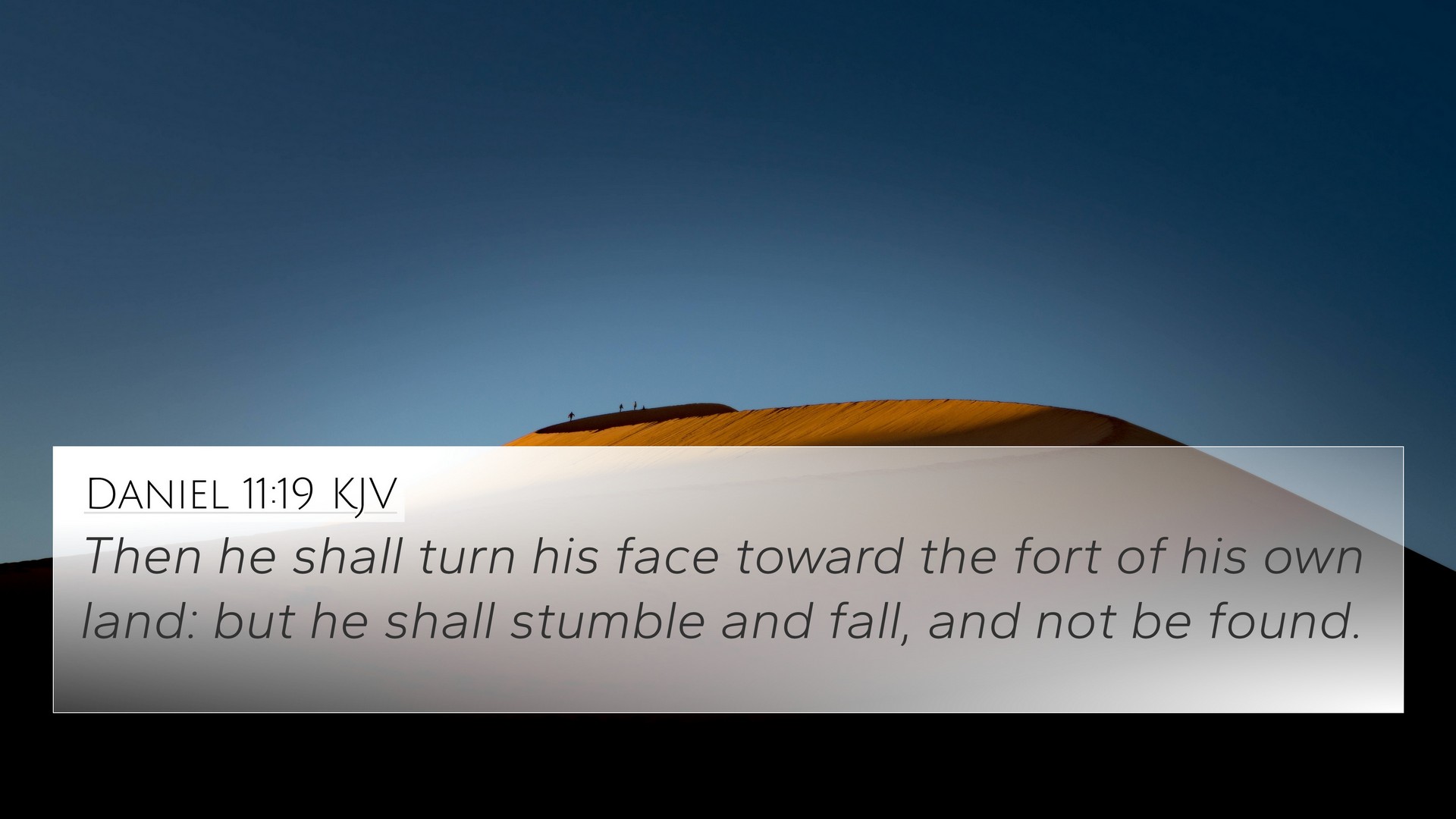Understanding Daniel 11:19
Bible Verse: "Then he shall turn his face toward the fortified cities of his own land; but he shall stumble and fall, and not be found." (Daniel 11:19)
Summary of Meaning
This verse marks a pivotal moment in the prophecy delivered by Daniel regarding the political movements and conflicts of the kings of the North and South. In Daniel 11:19, the failure of the king's ambitions and strategies is underscored. This reflects divine sovereignty in the affairs of nations and individuals, illustrating that despite human planning, God's will prevails.
Insights from Public Domain Commentaries
-
Matthew Henry:
Henry notes that this verse signifies the downfall of a king who attempts to reclaim authority and control over fortified cities. His misguided strategies lead to a significant stumble, demonstrating that those who rely on their own strength against God’s decree will ultimately fail.
-
Albert Barnes:
Barnes emphasizes the futility of political schemes that go against divine providence. He suggests that the king's attempt to take control reflects the broader struggle between good and evil, where divine purposes cannot be thwarted by human pride or rebellion.
-
Adam Clarke:
Clarke elaborates on the symbolic meaning of "turn his face" indicating a shift in focus or resources toward self-preservation. He asserts that the phrase “stumble and fall” symbolizes not only a physical defeat but also a moral and spiritual failure in recognizing greater divine authority.
Bible Verse Cross-References
This verse is connected to several other scriptures, illustrating the themes of downfall due to pride and the ultimate sovereignty of God over earthly powers.
- Proverbs 16:18: "Pride goes before destruction, and a haughty spirit before a fall."
- Isaiah 14:15: "Yet you shall be brought down to Sheol, to the far reaches of the pit."
- Jeremiah 10:23: "I know, O Lord, that the way of man is not in himself; that it is not in man who walks to direct his steps."
- Matthew 12:25: "Every kingdom divided against itself is laid waste, and no city or house divided against itself will stand."
- Psalm 37:20: "But the wicked will perish; the enemies of the Lord are like the glory of the pastures; they vanish—like smoke they vanish away."
- 1 Peter 5:5: "Clothe yourselves, all of you, with humility toward one another, for God opposes the proud but gives grace to the humble."
- Proverbs 28:18: "Whoever walks in integrity will be delivered, but he who is crooked in his ways will suddenly fall."
Connections Between Bible Verses
Daniel 11:19 not only reflects the historical context of Daniel's prophecies but also connects to various Biblical themes of pride, downfall, and divine sovereignty. The themes highlighted in this passage encourage readers to recognize the consequences of self-reliance in opposition to God’s ultimate plan.
Links Between the Prophets and Apostolic Teachings
This verse can be further examined in light of how the prophetic teachings foreshadow themes later addressed in the New Testament, particularly the warnings against pride and disobedience. For example, the writings of Paul often reflect similar concerns regarding the nature of the flesh versus the Spirit and the dangers of relying on one's understanding.
Thematic Bible Verse Connections
Many themes weave through the Bible, particularly concerning the consequences of human pride and the ultimate power of God. Understanding these connections enhances the faithful's grasp of scripture and emphasizes the importance of humility and reliance on God.
Cross-Referencing Bible Study Method
Utilizing a structured approach to cross-referencing allows for deeper insights into scripture. Tools such as a Bible concordance or cross-reference Bible study guides can facilitate understanding how various verses harmonize with one another.
Conclusion
In summary, Daniel 11:19 serves as a reminder of the limits of human power against the will of God, encapsulating significant themes found throughout the Bible. Through diligent study and cross-referencing with related scriptures, believers can gain profound insights into God’s providential care and sovereign authority over history.







